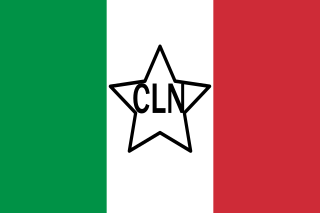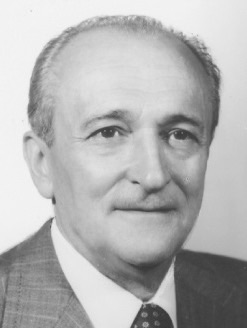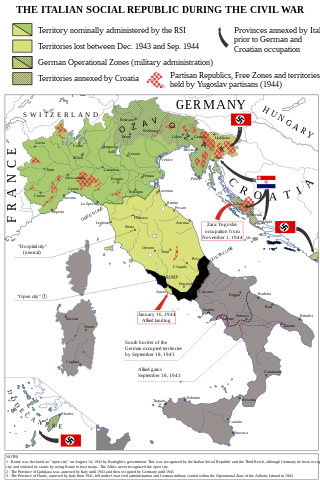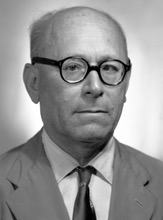Related Research Articles

The Italian Communist Party was a communist and democratic socialist political party in Italy. It was founded in Livorno as the Communist Party of Italy on 21 January 1921, when it seceded from the Italian Socialist Party (PSI), under the leadership of Amadeo Bordiga, Antonio Gramsci, and Nicola Bombacci. Outlawed during the Italian fascist regime, the party continued to operate underground and played a major role in the Italian resistance movement. The party's peaceful and national road to socialism, or the "Italian Road to Socialism", the realisation of the communist project through democracy, repudiating the use of violence and applying the Constitution of Italy in all its parts, a strategy inaugurated under Palmiro Togliatti but that some date back to Gramsci, would become the leitmotiv of the party's history.

Palmiro Michele Nicola Togliatti was an Italian politician and leader of Italy's Communist party for nearly forty years, from 1927 until his death. Born into a middle-class family, Togliatti received an education in law at the University of Turin, later served as an officer and was wounded in World War I, and became a tutor. Described as "severe in approach but extremely popular among the Communist base" and "a hero of his time, capable of courageous personal feats", his supporters gave him the nickname il Migliore. In 1930, Togliatti renounced Italian citizenship, and he became a citizen of the Soviet Union. Upon his death, Togliatti had a Soviet city named after him. Considered one of the founding fathers of the Italian Republic, he led Italy's Communist party from a few thousand members in 1943 to two million members in 1946.

Luigi Longo, also known as Gallo, was an Italian communist politician and general secretary of the Italian Communist Party from 1964 to 1972. He was also the first foreigner to be awarded an Order of Lenin.

The Italian resistance movement is an umbrella term for the Italian resistance groups who fought the occupying forces of Nazi Germany and the fascist collaborationists of the Italian Social Republic during the Second World War in Italy from 1943 to 1945. As a diverse anti-fascist movement and organisation, the Resistenza opposed Nazi Germany, as well as Nazi Germany's Italian puppet state regime, the Italian Social Republic, which the Germans created following the Nazi German invasion and military occupation of Italy by the Wehrmacht and the Waffen-SS from 8 September 1943 until 25 April 1945.

Ferruccio Parri was an Italian partisan and anti-fascist politician who served as the 29th Prime Minister of Italy, and the first to be appointed after the end of World War II. During the war, he was also known by his nom de guerreMaurizio.

Italian war crimes have mainly been associated with Fascist Italy in the Pacification of Libya, the Second Italo-Ethiopian War, the Spanish Civil War, and World War II.

Alessandro Natta was an Italian politician and secretary of the Italian Communist Party (PCI) from 1984 to 1988. An illuminist, Jacobin, and communist, as he used to describe himself, Natta represented the political and cultural prototype of a PCI militant and party member for over fifty years of the Italian democratic-republican history. After joining the PCI in 1945, he was deputy from 1948 to 1992, a member of the PCI's central committee starting in 1956, was part of the direction from 1963 and of the secretariat, first from 1962 to 1970 and then from 1979 to 1983, and leader of the PCI parliamentary group from 1972 to 1979; he was also the director of Rinascita from 1970 to 1972. After 1991, he did not join the PCI's successor parties.

General elections were held in Italy on 18 April 1948 to elect the first Parliament of the Italian Republic.

The Italian Civil War was a civil war in the Kingdom of Italy fought during the Italian campaign of World War II between Italian fascists and Italian partisans and, to a lesser extent, the Italian Co-belligerent Army.

The Axis leaders of World War II were important political and military figures during World War II. The Axis was established with the signing of the Tripartite Pact in 1940 and pursued a strongly militarist and nationalist ideology; with a policy of anti-communism. During the early phase of the war, puppet governments were established in their occupied nations. When the war ended, many of them faced trial for war crimes. The chief leaders were Adolf Hitler of Nazi Germany, Benito Mussolini of Fascist Italy, and Hirohito of Imperial Japan. Unlike what happened with the Allies, there was never a joint meeting of the main Axis heads of government, although Mussolini and Hitler met on a regular basis.

Emilio Sereni was an Italian writer, politician and historian.
Rinascita was a political and cultural magazine published in Rome, Italy, between 1944 and March 1991. It was one of the media outlets of Italian Communist Party (PCI).

Two of the three Axis powers of World War II—Nazi Germany and their Fascist Italian allies—committed war crimes in the Kingdom of Italy.

Umberto Elia Terracini was an Italian politician.
The Vinca massacre was a massacre carried out near Fivizzano, Tuscany, by the German 16th SS Panzergrenadier Division from 24 to 27 August 1944 in which 162 Italian civilians were killed.

The Schio massacre was a mass prisoner killing carried out by former Italian partisans of the Garibaldi Brigade and officers of the Auxiliary Partisan Police in the city jail of Schio on the night of 6–7 July 1945. Of the 54 people who were killed, only 27 of them were fascist supporters or had collaborated with the Germans. The massacre was investigated by the Allies and two trials with convictions followed.

The 4th Alpine Division "Monterosa" was one of four divisions raised by Mussolini's Italian Social Republic. It existed from 1 January 1944 until 28 April 1945.

The Tuscan Committee of National Liberation was an underground Italian resistance organisation during World War II based in Tuscany, Central Italy. An offshoot of the National Liberation Committee (CLN), it was charged with organising resistance and partisan activities throughout Tuscany. It was opposed to the forces of Nazi Germany as well as Nazi Germany's puppet state local regime, the Italian Social Republic, in Tuscany following the German invasion and military occupation of Italy between September 1943 and April 1945. The CTLN became an umbrella organisation for the five main anti-fascist partisan groups operating within Tuscany.

The French Permanent Military Tribunal in Saigon, also known as Saigon Trials was a war crimes tribunal which held 39 separate trials against suspected Japanese war criminals between October 1946 and March 1950. Its scope was limited to war crimes committed against the French population of French Indochina after the Japanese coup d'état in French Indochina. Shifts in French foreign policy during the Cold War and disruptions caused by the First Indochina War caused the number of convictions to dwindle as judges opted to discontinue criminal charges against the defendants or commuted their sentences.

Eugenio Reale was an Italian politician.
References
- ↑ Armellini, Arvise (5 April 2016). "New Study: Number of Casualties in Nazi Massacres in Italy Nearly Double as Previously Believed". Haaretz . Retrieved 28 November 2018.
- ↑ Neitzel, Sönke. "Book Review: Wehrmacht und Waffen-SS im Partisanenkrieg: Italien 1943-1945". Academia. Retrieved 28 November 2018.
- 1 2 3 4 5 6 7 Cooke 2011.
- ↑ Foot 2009, p. 179.
- ↑ Poloni, Fabio (October 13, 2005). "Indagine sui partigiani dopo 60 anni" (in Italian). La Tribuna di Treviso . Retrieved December 21, 2018.
- 1 2 3 4 Pombeni 2015.
- 1 2 3 "Foreign Relations of the United States, 1946, The British Commonwealth, Western and Central Europe, Volume V Document 628". Office of the Historian . Retrieved 28 November 2018.
- ↑ Dunnage 2013, p. 194.
Bibliography
- Cooke, Philip (2011). "The Togliatti amnesty". The Legacy of the Italian Resistance. Palgrave Macmillan. ISBN 978-0-230-11410-4.
- Foot, John (2009). "The Resistance". Italy's Divided Memory. Palgrave Macmillan. ISBN 978-0-230-10183-8.
- Dunnage, Jonathan (2013). Mussolini's Policemen: Behaviour, Ideology and Institutional Culture in Representation and Practice. Manchester University Press. ISBN 978-0-7190-8139-2.
- Pombeni, Paolo (2015). "Closing the Account with the Past. Clemency Measures: Amnesties and Reprieves (1946–1953)". The Historiography of Transition: Critical Phases in the Development of Modernity (1494-1973). Routledge. ISBN 978-1-138-12244-4.